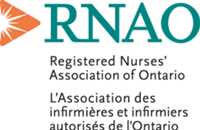RNAO welcomes assisted dying framework that includes RNs and NPs
TORONTO, Dec. 15, 2015 /CNW/ - An expert advisory group has acknowledged the crucial role registered nurses (RN) and nurse practitioners (NP) should play in end-of-life care, including assisted dying, in order to ensure universal access.
The Registered Nurses' Association of Ontario (RNAO) lauded the report from the Ontario-led provincial-territorial expert advisory group, released Monday, for detailing a principled framework to implement the Supreme Court of Canada's February decision to overturn the country's ban on assisted dying.
While the court's decision refers to "physician-assisted" dying, the expert report recommends that RNs and NPs also be involved in the process. The criminal code should be amended so RNs are able to provide assisted dying medications under the directive of an NP or physician, the report says.
RNAO has held extensive consultations on end-of-life issues with its members and the public for the past two years, and has insisted that RNs and NPs be part of any assisted dying strategy because of the interprofessional nature of health care in Canada.
"Nurses are already providing care for Canadians at the end of their lives, and often, they are doing so in communities that have limited access to physicians," says RNAO CEO Doris Grinspun. "Involving RNs and NPs in end-of-life care that includes comprehensive palliative care and assisted dying will give all Canadians equal access. And as nurses, we believe access to health services is a human right."
Nurses play a pivotal role in end-of-life care, and RNAO has long advocated for the development of a national palliative care strategy to ensure every Canadians has equal access to all options at the end of life – something that is echoed in the expert panel's recommendations.
"In order for Canadians to truly have choices at the end of their lives, access to excellent palliative care is paramount," Grinspun adds.
The report recommends that assisted dying be funded publicly through the provinces and territories, something RNAO strongly supports as it will ensure universal access. It also lays out important transparency and oversight measures, including establishing Canada-wide committees to review all cases of assisted dying and make reports to the public.
In addition, the expert advisory acknowledges that certain health providers and organizations may not wish to provide assisted dying due to conscientious objections. In those cases, care providers must inform patients of all end-of-life options – including assisted dying – and provide a timely referral or a direct transfer of care to another health professional, the report states.
"RNAO knows there is a diversity of views around assisted dying, and believes no health professional should be forced to provide it," says RNAO President Vanessa Burkoski. "This report acknowledges the rights of these care providers, while balancing them with a person-centred approach and an obligation to inform people of all their options."
To ensure health professionals are prepared to provide assisted dying, the report recommends that professional organizations, regulators, universities and patient groups collaborate to develop education programs. "RNAO is ready and eager to contribute its evidence-based and educational expertise, as well as robust outreach capacity," adds Burkoski.
Ontario will hold public consultations in January on the issues raised in the report. The Supreme Court of Canada gave the federal government until February 2016 to implement its ruling, though the government has asked for a six-month extension.
"The expert advisory group has provided an excellent blueprint that will enable timely access by leveraging on RNs and NPs' wealth of expertise," says Burkoski. "RNAO is calling on Prime Minister Trudeau and Premier Wynne to make these recommendations a reality."
The Registered Nurses' Association of Ontario (RNAO) is the professional association representing registered nurses, nurse practitioners, and nursing students in Ontario. Since 1925, RNAO has advocated for healthy public policy, promoted excellence in nursing practice, increased nurses' contribution to shaping the health-care system, and influenced decisions that affect nurses and the public they serve. For more information about RNAO, visit our website at RNAO.ca or follow us on Facebook and Twitter.
SOURCE Registered Nurses' Association of Ontario

or to interview a nurse, please contact: Daniel Punch, Communications Officer/Writer, Registered Nurses' Association of Ontario (RNAO), Phone: 416-408-5606 / 1-800-268-7199 ext. 250, [email protected]

Share this article